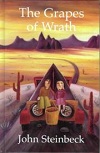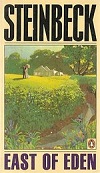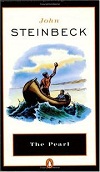Major Novels
John Steinbeck was a man of many stories. He wrote a multitude of novels as well as short stories and nonfiction works of literature. His work is still read today throughout schools as required reading and also as something to read in spare time. Some of his major works include: The Grapes of Wrath, Of Mice and Men, East of Eden, and The Pearl.
The Grapes of Wrath

John Steinbeck wrote The Grapes of Wrath in 1939. It later won the Pulitzer Prize in 1940. The book is set in the Great Depression and describes a family of sharecroppers who were driven from their land due to the dust storms of the Dust Bowl. The title is a reference to the Battle Hymn of the Republic. The book was unpopular amongst some critics who found it too sympathetic to the worker's plight and too critical of aspects of capitalism. Despite this fact, it found quite a large audience amongst the working class.
Of Mice and Men

Of Mice and Men was written in 1937. It was a tragedy that was written in the form of a play. It is the story of two traveling ranch worker trying to work up enough money to buy their own ranch. It encompasses themes of racism, loneliness, prejudice against the mentally ill, and the struggle for personal independence.
East Of Eden

East of Eden was published in 1952. It is often described as Steinbeck's most ambitious novel. This novel follows the interwoven stories of two families, the Trasks and the Hamiltons. The novel was originally adressed to his sons. Steinbeck wanted to describe the Salinas Valley for them in detail: the sights, sounds, smells, and colors. It is believed that the Hamilton family in the story is based on the real-life family of his maternal grandfather. According to his last wife, Steinbeck believed this to be his greatest novel.
The Pearl

The Pearl is Steinbeck's parable about wealth and the evil that it can bring. It tells the story of an Indian pearl-diver who finds "the Pearl of the world". The Indian believes this will change his life for the better and eventually becomes blinded by greed. The Pearl sets the values of the civilized world against those of the primitive and finds them tragically inadequate.
